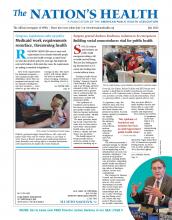
A California program is building leadership among farm-working women in rural areas.
Photo by Andresr, courtesy iStockphoto
Oahu’s Ewa district is a popular draw for Hawaii residents looking for affordable homes and good quality of life. But Ewa, home to Pearl Harbor, also neighbors an international airport and military base. Industrial and military activities have damaged waterways, threatened drinking water supplies and made it unsafe to eat fish caught nearby.
In 2015, residents came together to address the ongoing problems, conducting community cleanups and forming Hui O Ho’Ohonua, a nonprofit whose name loosely translates to “people united for a purpose to set the Earth right.” Thanks to a recent environmental justice grant coordinated by APHA, Hui O Ho’Ohonua’s work is being strengthened.
“We do monthly waterway cleanups that started with two or three people, but they’ve grown in size as we’re getting funding,” Anthony Chance, Hui O Ho’Ohonua’s founder, told The Nation’s Health. “Everything related to public health — whether it’s toxicity in soil or toxicity in food — is something we’re dealing with. Our long-term goal is food sustainability and getting people healthy.”
Hui O Ho’Ohonua is one of five organizations receiving funding through the latest round of the Advancing Environmental Justice Through Technical Assistance program. Supported through the National Environmental Health Partnership Council, the program provides both funding and technical assistance for communities working toward environmental justice.
The Organización en California de Líderes Campesinas, located in Oxnard, California, is also benefiting from the technical assistance program. The group builds leadership among farm-working women in rural areas with many migrant residents. New work includes development of an emergency public health response system that is both linguistically and culturally accessible, boosting safety for both workers and their families.
Other communities supported by the technical assistance program — funded by the National Center for Environmental Health and Agency for Toxic Substances and Disease Registry — are:
Maryland’s South Baltimore Community Land Trust, which supports affordable housing in South Baltimore, a community that once ranked as having some of the nation’s highest quantities of toxic air pollutants. Long an industrial area, waste incinerators threaten health of residents. Trust organizers are working to reduce emissions and create a city composting facility.
Healthy Homes Coalition of West Michigan, which works to protect children from toxic exposures in Grand Rapids, where recent data show that rates of children who have tested positive for lead have increased. The coalition is expanding its healthy housing work, including community education on the health hazards of lead, which can be found in old paint and aging water pipes.
West Atlanta Watershed Alliance, which protects the Georgia community’s health by addressing environmental issues such as illegal dumping and inadequate sewage systems. The volunteer group has united residents to preserve green space and protect water quality.
“In caring for the environment, everyone has their job and their purpose, but we’re working as a team,” Chance said. “We are in this together. It’s not about pointing fingers, but holding hands.”
For more information, visit www.apha.org/environmental-justice.
Michele Late contributed to this article
- Copyright The Nation’s Health, American Public Health Association












